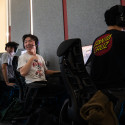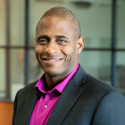Graduates tell stories of achievement as commencement approaches
The class of 2010 will produce a number of noteworthy graduates who did great things with their experience at the University of Wisconsin–Madison. In advance of this weekend’s commencement, we have profiled just a few of their successes:
She helps science, and science helps her
Being profoundly deaf didn’t stop Deborah Seiler from enjoying a collegiate swimming career. Arriving in Madison without financial support or a place to live posed more of a challenge.
Through setbacks that affected her life in and out of the classroom, Seiler’s energy and enthusiasm have inspired those around her. She will graduate with a master of science degree in Environment and Resources from the Nelson Institute for Environmental Studies.
Originally from the northern California town of Auburn, Seiler studies Facebook — specifically, the role of online social networks in grassroots conservation outreach. Though her research could have taken place in one of several departments, she values how the Nelson Institute’s interdisciplinary approach connected her to every department on campus, exposing her to a wide variety of research.
In 2008 and 2009, Seiler received cochlear implants. Surgeons implanted electronic devices to stimulate her auditory nerves, giving her “prostheses” that provided a sense of sound. Though this technology is controversial within the deaf community, Seiler is not culturally deaf; since her gradual hearing loss began at age 5, she grew up speaking and does not use sign language. By choosing to go through with this surgery as a young adult, her results have had a direct impact on her chosen career path.
“I’ve wanted to be a science journalist for a long time, but it was never feasible to be serious about making a living interviewing people if I couldn’t hear,” says Seiler. “In the past year, that option has opened up again. I can now use the phone and understand groups of people at meetings. It’s incredible how much this has liberated my future.”
Before receiving the implants, Seiler used assistive services (such as notetaking and live captioning) through UW’s McBurney Center. The spring semester marks the first time since high school that she could participate in classes on her own. In addition, she has finally been able to teach other students. Serving as a TA in the zoology department during the past year provided both valuable experience and a way to help pay for her own education.
Through all of the ups and downs she’s faced while getting acclimated to these new opportunities, Seiler’s sense of independence and curiosity have served her well. Asked for advice to other students, she responds with her usual wry optimism: “Feeling clueless just means you’ve finally gotten to the point where you can work on problems that don’t already have answers.”
A freshman at age 48, Molinda Henry completes one more step in her odyssey
After Molinda Henry’s daughter graduated from Brown University in 2006, she took off her cap and gown, handed them to her mother and said, “Now it’s your turn.” The academic baton was passed and Henry will wear that cap and gown on May 16 when she graduates from UW–Madison with a bachelor’s degree in African American studies.
Military service, raising children and other issues got in the way of college. By age 48, Henry’s kids were grown and launched. She was getting by at a job, but she wanted more.
When she heard about the Odyssey Program, run by UW–Madison professor Emily Auerbach, she knew she had found her chance. The voices of everyone around her told her to go back to school.
“My kids said I can. Emily said I can. Gov. Doyle said I can, with veterans’ tuition benefits. Then, I told myself I can — and that I would,” says Henry.
With tears and a deep breath for courage, she gave up the security of her job and joined the 2006-2007 Odyssey class. At the same time, she took classes at Madison College that would transfer to UW–Madison.
“I needed to learn how to learn and how to study. Odyssey prepares you for that. It’s a springboard so you can build muscle of self-esteem and determination,” Henry says. “I learned not to be afraid and to stand up for myself.”
Since then, she’s taken classes during every semester and summer session. She is applying for grants and wants to teach literature arts and history in Jamaica or Africa, intrigued by possible cultural exchanges. She also hopes to get a master’s degree in a year.
“I can’t see past May 16. I can’t lose focus. Nothing is going to stop me. I can’t wait to march across that stage,” says Henry.
Journalism graduates take their storytelling skills to the world
Tired of struggling with Spanish in high school, Jacob Kushner came to UW–Madison thinking he’d finally left it behind. Four years later, he’s parlaying his now-fluent command of the language into a career in international journalism.
Kushner, of Milwaukee, will graduate with a bachelor’s degree in journalism and Latin American studies. After working for UW’s Study Abroad Program in the Dominican Republic, he plans to stay and work as a freelance multimedia journalist in the Dominican Republic and Haiti. Among other things, he’ll examine the aftermath of the Haitian earthquake and how the earthquake has altered the relationship between the people of both countries.
As a reporting intern with the Wisconsin Center for Investigative Journalism, now in its second year, Kushner has combined his Spanish skills with his passion for fact-finding. During an earlier trip to the Dominican Republic, he conducted research in schools to examine discrimination against Haitians. Back on campus, he has served as the center’s lead reporter on its Dairyland Diversity project, exploring how immigration is reshaping Wisconsin’s dairy industry.
Kushner isn’t the only j-schooler with an eye on the world. He and three fellow graduates plan to create a website to document their experiences and serve as a resource for other students who want to use their journalism skills abroad.
Sara Jerving, of Madison, also served as a reporter for the Center for Investigative Journalism. She plans to return to Kenya, where she worked for a community radio station. Alec Luhn, of Stoughton, spent a year in Russia and will return to Central Asia, particularly Kyrgyzstan. Like Jerving, Jake Naughton, of Brookfield, also spent time in Kenya and plans to return; he will also work with Kushner to document issues in Haiti.
“It’s not about the programs or degrees; it’s about the people and connections you make,” says Kushner. “My friends are suddenly becoming my colleagues. The professors who make connections between international journalism and the Madison journalism community have made it possible to do what I’m about to do.”
“Local boy makes good” — with a uniquely Madison twist
Brian Jinho Lee may be a Madison native, but his time here hasn’t always been typical. Born during his father’s graduate studies in educational psychology, he stayed until his father received his Ph.D. After three years in the family’s home country of South Korea, where his father remains a professor at Inje University, his mother returned to the United States in 2000 so Brian and his siblings could study here.
Lee’s hard work has validated his parents’ foresight. He will complete his bachelor of science degree in August with a double major in music (violin performance) and medical microbiology and immunology, participating in commencement exercises on Sunday, May 16.
A National Merit and Wisconsin All-State Scholar, Lee fully funded his college education with scholarships from the Schoenleber Foundation and UW’s Summer Music Clinic. An accomplished violinist studying with professor Tyrone Greive, Lee has served as co-concertmaster of the UW Symphony, performing in orchestras during each of his four years on campus.
Meanwhile, he has prepared for a career in medicine by excelling in the lab. He conducted research on the Epstein-Barr virus life cycle with professor Shannon Kenney in the McArdle Cancer Laboratory, supported by a Hilldale Fellowship. One week after completing his studies in August, he will move to Baltimore to begin medical school at The Johns Hopkins University.
A graduate of Madison’s Memorial High School, Lee accomplished all of this while serving as guardian to his two younger siblings following his mother’s return to Korea. His sister Jane, also a Memorial graduate, will follow in his footsteps this fall. She has received similar honors — including the Music Clinic scholarship.
Oral surgeon, dentist and — finally — UW–Madison graduate
Richard Smith enjoyed all of the aspects of campus life: the social whirl, the renowned professors. But back when he started, Helen C. White was a living person, not a building.
After leaving UW–Madison a year early, Smith returned nearly 50 years later to complete his undergraduate degree. He will receive a bachelor of science degree, with majors in history and the history of science, during this weekend’s commencement ceremonies.
Now living in California’s Marin County, just north of San Francisco, Smith’s unusual situation resulted from early acceptance at Columbia University’s School of Dental Medicine. For the past 42 years, he has enjoyed a successful career as an oral surgeon. Semi-retired, he is clinical professor emeritus and director of the University of California-San Francisco Surgery Center.
As Smith scaled back his practice, he wanted to resolve what he considered an incomplete task. Always a history buff, and particularly fond of the history of science, he looked for a mentor with these things in common. In Walt Schalick, also a physician like himself, Smith found a willing partner. He contacted Schalick and asked if they could work together in directed study over the Internet.
“This was a new endeavor for both of us, since neither of us had done anything like this before,” recalls Smith. “He called me a pioneer.”
During the past year, Smith completed courses on the history of disability, the history of health and healing, the origin of scientific thought, geologic science, and American history. Online tools such as e-mail, Learn@UW, iTunes and Google Maps connected him with professors in Wisconsin, who provided feedback as he responded to assigned readings and took exams.
“I used to be what I considered a traditionalist regarding education — you have to go to lecture and do it conventionally,” says Smith. “But with the technology available now, I’m not so sure that’s the case anymore. Students can communicate; professors can stay in the loop and provide feedback. There are other ways of gaining knowledge, so students should take advantage of everything the university has to offer.”
As for the future? Smith sees no reason to stop now. He plans to continue studying through UW–Madison as a special student.
–Gwen Evans contributed to this article
Tags: commencement



